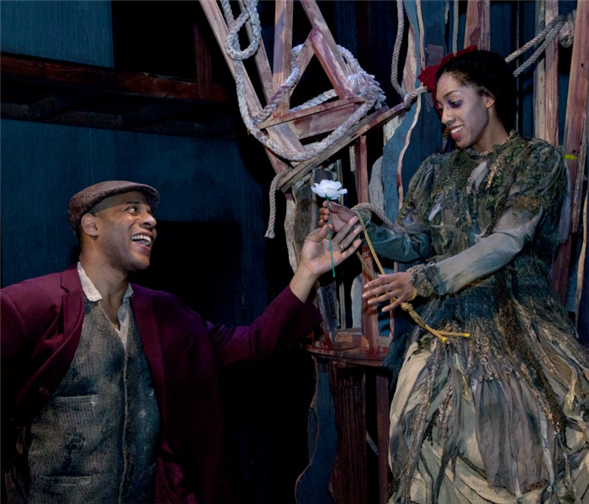Translate Page

A new play examines the 1918 lynchings of Mary Turner and her husband
---
A hundred years ago in Valdosta, Georgia, at least a dozen African Americans were lynched within a few days of one another. One of them, Mary Turner, was 20 years old and eight months pregnant.
"I was surprised I'd never heard the story before," says LeKethia Dalcoe, an actor, author, and activist who used some of those stomach-churning murders as the basis for her first play, A Small Oak Tree Runs Red. Originally commissioned by Chicago's Congo Square Theatre, the racially charged drama is receiving its New York premiere at Brooklyn's Billie Holiday Theatre. It also marks the New York stage directorial debut of well-known TV and film actor Harry Lennix (The Blacklist, 24, as well as August Wilson's Radio Golf on Broadway).
"I was very apprehensive about agreeing to direct," admits Lennix, who also helmed the show in Chicago. "But I was compelled by the story -- the horror of it."
Both the playwright and the director were faced with a challenge: How to turn such ugly history into art? Dalcoe says she was helped by the understanding that, "as dark as the events are, they surround a love story."
Accused of being an accessory in the slaying of a white plantation owner, Hayes Turner -- Mary's husband -- was one of multiple black men lynched on May 18, 1918. Mary protested the killing, publicly threatening to take out warrants against her husband's murderers. "For a woman to speak out against the lynching of her husband at that time and place, she had to know there was going to be some consequence," Dalcoe says. Mary's "unwise remarks," as the local newspaper labeled them, resulted in her own lynching the next day.
The play tells the story with just three characters: Mary, Hayes, and Sidney Johnson, the man who committed the crime that set off the rampage. The trio is placed in purgatory and the events unfold as memory. Now and then, they remove pieces of paper attached to dangling ropes and read from actual published accounts. The white mob is represented only by the sound of angry voices.
"It's an unusual play," says Lennix. "It's a memory play, like The Glass Menagerie, but the characters are dying onstage." Lennix wanted to dramatize the story without turning it into what he calls "suffering porn. Frequently I find the stories about black people's servitude and pain are a little indulgent, or masochistic and exploitative. I wanted to poeticize this story."
To do so, he is using what he calls "low-tech magic" inspired by Tony-winning director Julie Taymor. Lennix acted in Titus, Taymor's 1999 film adaptation of Shakespeare's bloodiest tragedy Titus Andronicus, which used lyrical imagery such as replacing Lavinia's severed hands with tree branches. In A Small Oak Tree Runs Red, Kyra Riley, who portrays Mary, lifts her apron above her head while silken ribbons fall to the ground. "That represents the moment when the mob cut Mary's baby out of her womb," Lennix says.
{Image1}
To Indira Etwaroo, the executive director of the Billie Holiday Theatre, the show is "beautifully told and highly resonant." Considering the venue's namesake made a hit out of "Strange Fruit," a song about lynching, the play is an apt selection for the 46-year-old theatre in Bedford-Stuyvesant, which reopened in 2017 after a renovation that took two years and $4.1 million.
"Our theatre was founded to tell stories that illuminate the lives of people of African descent, and this year is the hundredth anniversary of the lynching," Etwaroo says. Sadly, given the recent rise in racist speech and hate crimes in our country, she believes that "history has come full circle 100 years later." She points in particular to the appearance last year of three nooses in New York City: one at the Metropolitan Opera House, another on a tree outside the Brooklyn Museum, and another on a tree outside the Bedford-Stuyvesant branch of the Brooklyn Public Library.
"There is lynching happening all across America," Lennix says. "I'm suspicious of a great many of these 'prison suicides.'"
"Trayvon Martin seemed like a form of lynching to me," adds Dalcoe about the unarmed black teen who was shot and killed in 2012 by a neighborhood watch volunteer in Florida.
Since Dalcoe's brother-in-law is stationed at a nearby military base, the playwright recently visited the town of Valdosta, Georgia for the first time. "I saw the river, trees, moss, the lone road where the lynching took place," she says, adding that she also spied a plaque for Mary Turner. "There were three fresh bullet holes in it."
---
TDF MEMBERS: At press time, discount tickets were available for A Small Oak Tree Runs Red. Go here to browse our current offers.
Jonathan Mandell is a drama critic and journalist based in New York. Visit his blog at NewYorkTheater.me or follow him on Twitter at @NewYorkTheater. Follow TDF at @TDFNYC.
Top image: RJ Foster and Kyra Riley in A Small Oak Tree Runs Red. Photos by Hollis King.